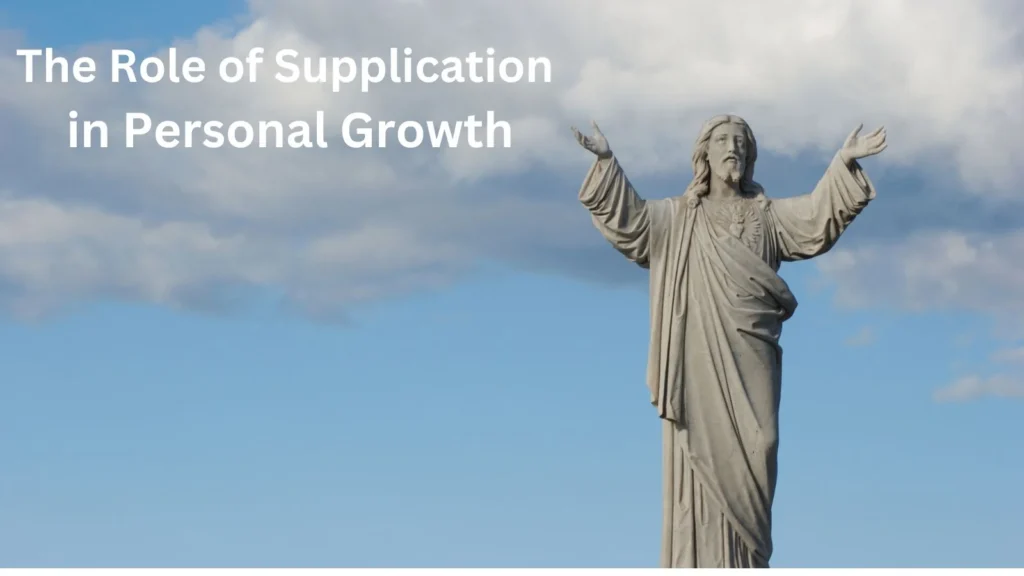Last Updated on November 1, 2024 by Ethan Richards
Supplication, a form of earnest, humble prayer, holds transformative power that goes beyond traditional petitions. It plays a crucial role in personal relationships, spiritual growth, and deepening one’s connection with God.
This blog post delves into the essence of supplication, exploring its impact on relationships, personal development, and spiritual intimacy, all while providing practical steps and biblical insights to help you incorporate supplication into your daily life.
The Essence of Supplication in Relationships
Definition and Understanding Supplication
Supplication is more than just a simple request—it’s an earnest, humble plea made from a position of need or deep desire. It’s a form of prayer that involves sincerely asking for help, guidance, or intervention. In the Bible, supplication is often highlighted as a key aspect of prayer, emphasizing humility and earnestness. Unlike general prayers, which can include thanksgiving and praise, supplication is specifically about making requests with a genuine heart.
Biblical Foundations
Scriptures consistently emphasize the importance of supplication in nurturing one’s relationship with God and others. For instance:
- Philippians 4:6: “Do not be anxious about anything, but in every situation, by prayer and supplication, with thanksgiving, present your requests to God.”
- James 5:16: “The effective, fervent prayer of a righteous person avails much.”
These verses highlight how supplication is not just about asking but doing so with a fervent and sincere heart, deeply trusting in God’s ability to provide.
Real-Life Applications
Supplication plays a vital role in personal and familial relationships by fostering a deeper sense of empathy and understanding. When individuals engage in supplication together, whether as a family, couple, or community, it can bring about unity and collective focus on shared goals or challenges. For example, a family that prays together, earnestly asking for guidance during a tough decision, can find a shared sense of peace and direction.
The Impact of Supplication on Relationship Dynamics

Improving Communication
Supplication can significantly enhance communication within relationships by modeling humility and vulnerability. When you approach someone with a sincere request, it opens the door for honest dialogue. In the context of a relationship, this practice encourages partners to be open about their needs, fostering a deeper level of mutual understanding.
Conflict Resolution
In moments of conflict, supplication can serve as a powerful tool for seeking divine intervention and guidance. By turning to God in times of disagreement, individuals can shift their focus from winning an argument to finding a resolution that honors God and maintains peace. This approach can reduce tensions and create a more harmonious environment, as both parties are reminded to humble themselves and seek a higher purpose in their interactions.
Strengthening Bonds
When people engage in supplication together, it often results in strengthened emotional and spiritual bonds. Shared supplication creates a space where individuals can express their deepest fears, hopes, and desires, fostering a profound sense of connection. For example, couples who pray together regularly report feeling more connected and supported, both emotionally and spiritually.
Developing a Deeper Connection Through Supplication
Connection with God
Supplication is a direct pathway to building a closer relationship with God. Unlike routine prayers that might become mechanical, supplication requires a heartfelt engagement that draws you nearer to God. It’s a practice that invites you to lay your deepest concerns before Him, trusting in His wisdom and timing. As you consistently bring your needs and desires to God through supplication, you develop a deeper reliance on His provision and grace.
Connection with Others
Supplication also enhances connections with others by encouraging a spirit of empathy and understanding. When you pray for others, especially those with whom you have a close relationship, you begin to see their struggles and needs through a compassionate lens. This practice can soften your heart towards others, making it easier to forgive, support, and love unconditionally.
Case Studies
- Case Study 1: A Family’s Healing: A family experiencing tension and miscommunication began incorporating supplication into their daily routine. Over time, they noticed a significant improvement in their communication and a renewed sense of unity.
- Case Study 2: Strengthening Marital Bonds: A couple facing marital challenges committed to daily supplication together. They reported a deeper emotional connection and an increased sense of partnership in tackling their issues.
Cultivating Gratitude and Humility Through Supplication
Gratitude as a Core Component
Supplication naturally cultivates gratitude by reminding individuals of their dependence on something greater than themselves. When you approach God with your needs, it shifts your perspective from self-reliance to appreciation for the blessings already present. This mindset of thankfulness can permeate all areas of life, making you more appreciative of the small and big things alike.
Humility in Practice
Supplication demands humility—it requires acknowledging that you don’t have all the answers and need divine guidance. This humility extends into your relationships, as you become more willing to listen, compromise, and serve others without expecting anything in return. In practice, this might look like offering a heartfelt prayer for a friend in need or seeking God’s wisdom before making a major decision.
Practical Steps
- Daily Gratitude Journaling: Incorporate a few minutes each day to write down what you’re thankful for before engaging in supplication.
- Focus on Others in Prayer: Regularly include supplications for others’ needs, not just your own, to foster a selfless attitude.
The Role of Supplication in Personal Growth

Supplication as Self-Reflection
Supplication offers a unique opportunity for self-reflection and personal growth. As you lay your requests before God, you’re also forced to confront your own desires, fears, and motivations. This introspection can lead to greater self-awareness and a clearer understanding of your personal goals and values.
Overcoming Personal Challenges
Supplication can be a powerful tool in overcoming personal challenges such as anxiety, fear, and doubt. By regularly bringing these struggles to God, you can experience a sense of release and peace, knowing that you are not carrying these burdens alone. This practice not only helps alleviate stress but also builds resilience as you learn to trust in God’s timing and plan.
Scriptural Insights
- Psalm 55:22: “Cast your burden on the Lord, and He will sustain you.”
- 1 Peter 5:7: “Cast all your anxiety on Him because He cares for you.”
These verses remind us of the importance of turning to God with our struggles, trusting that He will provide support and guidance.
Benefits of Supplication in Personal Growth
Emotional Well-being
Regular supplication has been shown to significantly improve emotional well-being. When you consistently bring your concerns to God, it can reduce feelings of anxiety and increase your overall sense of peace. This practice can also foster a positive outlook, as you learn to trust in God’s provision rather than dwelling on your circumstances.
Spiritual Maturity
Supplication is a key component of spiritual growth. It encourages a deeper reliance on God and a more intimate understanding of His character. As you continue to seek God through supplication, you develop spiritual maturity, characterized by a strong faith, resilience in the face of challenges, and a commitment to living out your beliefs.
Practical Outcomes
| Benefit | Description |
| Reduced Stress | Supplication provides an outlet for expressing concerns. |
| Increased Resilience | Builds trust in God’s plan, fostering resilience. |
| Enhanced Focus | Regular supplication helps clarify personal priorities. |
| Stronger Faith | Consistent prayer builds a deeper relationship with God. |
Supplication as a Form of Worship
Worship Beyond Ritual
Supplication transcends ritualistic prayer by transforming into a profound act of worship. When you approach supplication with a sincere heart, it becomes a way to honor God, acknowledging His sovereignty and your dependence on Him. This form of worship goes beyond mere words, engaging the heart and mind in a deeper spiritual connection.
Heartfelt Surrender
At the core of supplication is the act of surrender—yielding control and trusting God’s will above your own. This surrender is a powerful form of worship because it recognizes God’s authority and invites His intervention in your life. The most impactful supplications come from a place of complete honesty and vulnerability, where you lay down your desires and trust God to shape the outcome.
Community Worship
Supplication can also be a communal act, enriching the worship experience within a group or church setting. Whether through corporate prayers of supplication or small group sessions, engaging in supplication together fosters a sense of community and shared faith. This collective approach can be especially powerful, as it unites people in their common goals and dependence on God.
The Importance of Sincerity in Supplication
True Intentions
Sincerity is the cornerstone of effective supplication. Without genuine intent, supplication can easily become a hollow exercise. True supplication requires a heart that is fully engaged, earnestly seeking God’s intervention with honest intentions. It’s not just about saying the right words but truly meaning them from the depths of your heart.
Avoiding Ritualism
It’s easy to fall into the trap of ritualistic prayer, where supplication becomes more about routine than relationship. To avoid this, focus on keeping your supplications fresh and relevant. Rather than reciting the same requests daily, take time to reflect on your current needs and those of others. This keeps your supplications dynamic and sincere.
Scriptural Warnings
- Matthew 6:7: “And when you pray, do not keep on babbling like pagans, for they think they will be heard because of their many words.”
This verse serves as a reminder to approach supplication with authenticity, avoiding empty repetitions that lack heartfelt engagement.
What the Bible Says About the Secret Place

Understanding the Secret Place
The concept of the “secret place” is often referenced in the Bible as a private, sacred space where one can commune with God. It’s a metaphorical place where distractions are set aside, allowing for deep, focused prayer and supplication. The secret place is described in Matthew 6:6: “But when you pray, go into your room, close the door and pray to your Father, who is unseen.”
Supplication in the Secret Place
Engaging in supplication within the secret place allows for a more intimate and personal connection with God. It’s a space where you can be completely honest, without the pressure of public performance or the influence of outside opinions. This level of privacy encourages deeper sincerity and vulnerability, leading to a more meaningful supplicatory experience.
Examples from Scripture
- David’s Psalms: David often sought God in solitude, expressing his deepest emotions and needs through supplication (e.g., Psalm 63:1).
- Daniel’s Prayer: Daniel made a habit of praying alone in his room, even when it was forbidden, demonstrating the importance of private supplication (Daniel 6:10).
How to Cultivate Intimacy with God in the Secret Place
Practical Steps
- Set a Regular Time: Dedicate specific times each day for private supplication, free from distractions.
- Create a Physical Space: Designate a quiet area in your home as your “secret place,” equipped with anything that helps you focus, like a Bible, journal, or soothing music.
- Be Honest and Vulnerable: Use this time to be completely open with God, sharing your deepest fears, hopes, and questions.
Consistency and Commitment
Consistency is key to cultivating intimacy with God. Regularly setting aside time for supplication helps build a rhythm that strengthens your relationship with God. Commitment to this practice, even when it feels difficult or inconvenient, is crucial for deepening your spiritual connection.
Overcoming Distractions
- Turn Off Devices: Ensure that all electronic devices are turned off or set aside to minimize interruptions.
- Mindful Breathing: Start with a few moments of mindful breathing to center your thoughts and prepare your heart for supplication.
- Focused Prayers: Keep your prayers focused and specific, avoiding the temptation to let your mind wander.
Conclusion
Supplication is more than just asking—it’s a powerful, transformative practice that deepens relationships, fosters personal growth, and enhances spiritual intimacy. By approaching supplication with sincerity, humility, and a genuine heart, you can unlock its full potential, experiencing profound changes in your connection with God and others. As you continue to incorporate supplication into your daily life, may you find peace, guidance, and a deeper sense of purpose in your spiritual journey.

James Wilson is a renowned biblical scholar and dream expert, dedicated to exploring the spiritual dimensions of dreams. His in-depth knowledge and compassionate approach provide readers with valuable tools to understand and embrace the divine messages revealed in their dreams.










